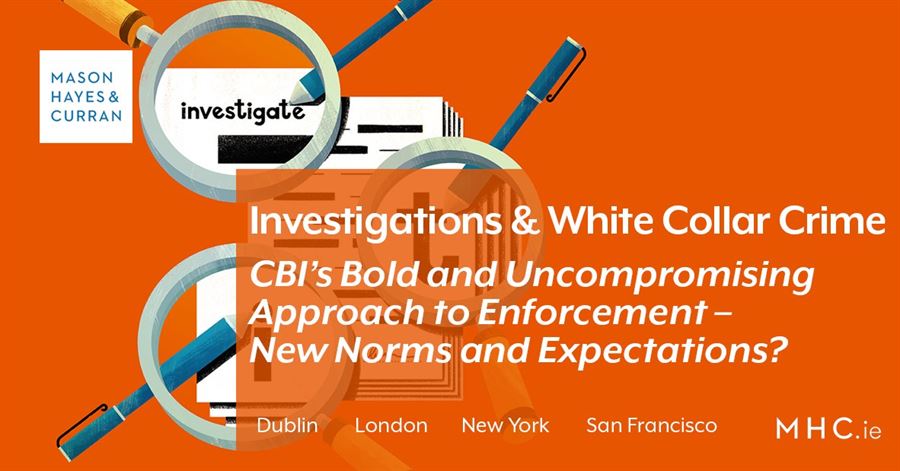Investigations & White Collar Crime: CBI’s Bold and Uncompromising Approach to Enforcement – New Norms and Expectations?

In recent weeks, the Irish financial regulator has flexed its supervisory muscles and ramped up its enforcement activities. Irish and international institutions, including some Wall Street heavyweights, have all found themselves in the crosshairs. Here, we look at the root causes for the actions of the Central Bank of Ireland (CBI) and whether this bold and uncompromising approach will persist.
Failing the customer
The CBI recently reprimanded Permanent TSB (PTSB) and imposed its largest ever fine of €21 million on account of “serious failings”. The language of the press statement announcing the fine was forceful. It berated the bank, eventhough PTSB acknowledged its wrongdoing and accordingly, entitled it to avail of the maximum reduction of 30% of the original fine.
Notably, the regulator used the opportunity to demonstrate its enforcement prowess. It has forewarned firms in no uncertain terms that its investigatory approach is “intrusive and forensic” and that the response to regulatory failures will be “robust”.
Fund Administration Services
Next it was JP Morgan’s turn. JPMAS, its fund administration services arm, was fined €1.6 million. The CBI denounced JPMAS’s regulatory breaches and used the press announcement to clearly illustrate and restate its standards and expectations. The statement criticised the firm’s failure to properly oversee the outsourcing of administrative services which the CBI said frustrated its ability to “properly assess, monitor and supervise… regulated activities.”
Reporting and good governance
Wells Fargo was the latest firm to experience the CBI’s censure. The breaches in that instance arose from internal controls, reporting capability and compliance which resulted in a penalty of €5.8 million. The accompanying press announcement laid blame at the firm’s internal governance arrangements, in particular the board of directors. The Director of Enforcement emphasised the role of the board in maintaining “the integrity of the firm’s regulatory reporting systems and for the early detection of risks.”
Comment
It is hardly a coincidence that the CBI’s recent flurry of regulatory decisions comes mere months before the UK’s departure from the EU. The regulatory regime in Ireland has taken on a distinctly international flavour since the arrival of many overseas players as they seek alternative homes following Brexit. With the arrival of international players comes enhanced regulatory surveillance and the imposition of international standards. The enforcement pronouncements that follow the CBI’s investigations leave no room for doubt that all regulatory breaches will be heavily probed and firmly penalised where necessary. The CBI performance to date shows that it will deliver a stinging public rebuke to those responsible for subpar regulatory compliance when it feels it is warranted.
While the CBI frequently takes its lead from across the Irish Sea, their approach in this regard differs significantly to the Final Notices issued by the UK’s Financial Conduct Authority (FCA). The tone of the CBI is bolder and uncompromising. This will undoubtedly lead decision makers to take its role seriously to ensure that Ireland has standards comparable to any global financial centre.
Like the FCA, the CBI is increasingly providing on-going guidance for firms regarding its expectations for market participants in the speeches and public pronouncements by its officials. In a telling interview with the Financial Times, the CBI’s Director General Derville Rowland indicated that it will be individuals, rather than firms, who will next be held to public account. As the CBI’s Director General follows the path paved by the FCA and introduces the Senior Executive Accountability Regime, it will be individual responsibility and/or culpability, together with culture reform, that will next fall under regulatory scrutiny. These new standards of oversight and enforcement show no sign of abating and this new order is one we should assume is here to stay.
For more information on how your organisation can ensure full compliance with its numerous and varied regulatory duties, contact a member of our Investigations & White Collar Crime team.
The content of this article is provided for information purposes only and does not constitute legal or other advice.
Share this:



